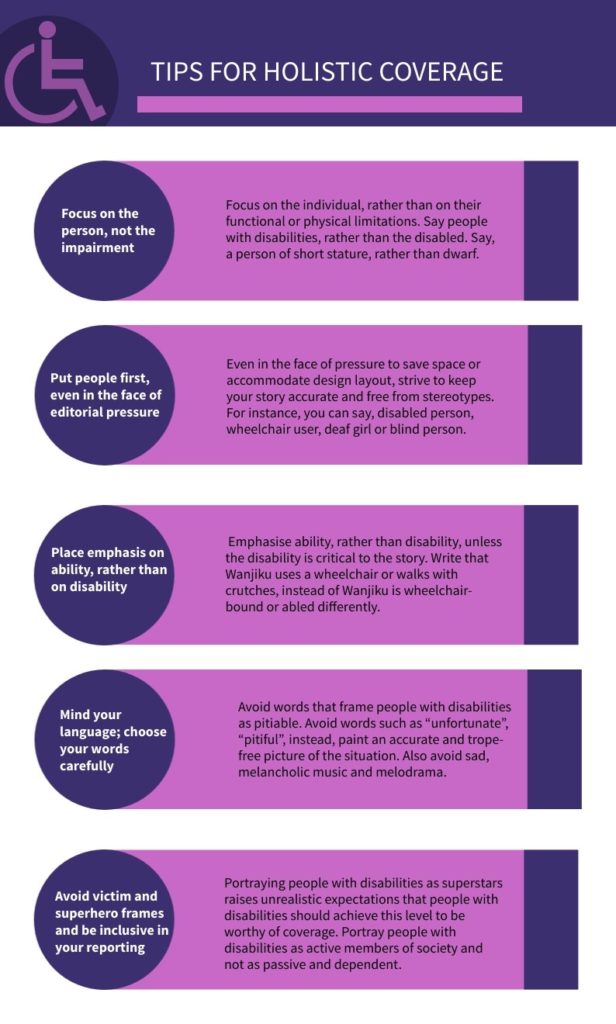It’s time to ditch the stereotypes and cover persons with disabilities as equal members of society who are more than their disability, writes Jackie Lidubwi
People with disabilities experience inequalities across many aspects of society. They are often denied access to opportunities available to their non-disabled counterparts. A UN writeup on disability and the media notes that persons with disability, who make up 15 per cent of the world’s population, are also grossly underrepresented in the media, which often fails to cover them; and when it does, it misrepresents them, reinforces negative stereotypes or portrays them in stigmatising ways. Such images and stories fuel the narrative that persons with disability are either victims who can only be pitied or superheroes.
Research has documented the stereotypes about disability that appear in media and how they reinforce skewed perceptions about persons with disability. Some of the stereotypes highlighted by Colins Barnes in a 1992 study on the portrayal of persons with disabilities in the media are still advanced today. They include images and stories that stereotype persons with disabilities as pitiable, helpless and dependent, objects of violence, or objects of curiosity and ridicule. Often, media also portrays persons with disability as a burden or as people who are not part of ‘mainstream society.
Common stereotypes
In Kenya, where one in 10 people have a disability, media producers do not emphasise the representation of people with disabilities in their outlets, and when they do, stories about persons with disability being chained or locked up, are common. They reinforce the stereotype that people with disabilities are burdensome. A story published last year about how 68-year-old Kenyan man Emmanuel Turere was rescued by the police after being caged over a land dispute depicted him as being burdensome to society to the point of being put in a cage. Another story featured a 56-year-old mother who was advised to kill her son, who has epilepsy and physical disabilities because he is “a curse”.
A 2018 study analysing the content of Daily Nation, the most widely-read newspaper in Kenya, found that in one in five of the news stories analysed framed persons with disability as stigmatised and marginalised. The study also found that there is scanty information on disability issues in Kenyan media, and that people with disabilities are only seen in the media when they have outstanding achievement, are seeking medical help or when their disability is considered to be of a rare kind, or to commemorate days like the International Day of Persons with disabilities. In 2017 when Goldalyn Kakuya, a girl with albinism, topped that year’s national exams, top media outlets crafted headlines like ‘Golden Girl’ and ‘A Girl Defying All Odds’, thereby perpetuating the superhero stereotype for persons with disability who are achievers.
In the study titled Media framing of disability: A content analysis of the Daily Nation Newspaper in Kenya, Maureen Abwao wrote: “Persons with disabilities seldom appear as hosts or guests on other subject matters other than on disability issues.” This is in congruence with Barnes’ research which found that persons with disabilities are rarely ever seen in the media in everyday situations. They only appear when there is a disability frame or angle.
“Disabled people are rarely shown as integral and productive members of the community; as students, as teachers, as part of the workforce or as parents. The absence of such portrayals feeds the notion that disabled people are inferior human beings who should be segregated,” wrote Barnes in his study of how disability is portrayed in British media.
“Disabled people are rarely shown as integral and productive members of the community.” – Colins Barnes
Another media analysis on the reporting about killings of people with albinism in Tanzania found that while the murders were fueled by superstitions and misconceptions about albinism, the media was complicit in spreading myths and stereotypes that strengthened these perceptions.
While stories that highlight the challenges of disability, which cannot be ignored, the focus on depicting persons with disability as only newsworthy when highlighting them as pitiable or as victims, or on the flip side, as objects of curiosity or as superheroes, should not go unchallenged. They present a view of persons with disability that is not holistic.
While highlighting the difficulties people with disabilities face during the COVID-19 pandemic Begging Questions that aired in 2020 had a stereotypical angle. It painted people with disabilities as beggars who require alms. The journalist may have been well-meaning, but he did not invest time to show that the story was about beggars who have a disability, rather than about people with disabilities as a whole.
Problematic framing
In Representing Disability in an Ableist World: Essays on Mass Media Beth Haller wrote that this framing of people with disabilities as different and not fitting in the mainstream has an effect on how society views disability, and on how people with disabilities view themselves. Given the power of the media to drive perceptions and norms, research has shown the need for reporting criteria for disability issues so that the media can play its role of providing accurate information, rather than advancing stereotypes through problematic story angles. The media is a vital instrument in raising awareness and countering stigma and misinformation, and studies conducted in Sub-Saharan Africa have identified radio broadcasts as a valuable strategy for reducing disability stigma.
How to report holistically where a person with a disability is involved




